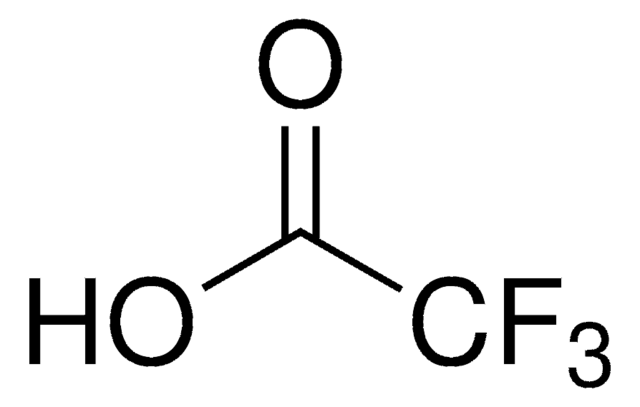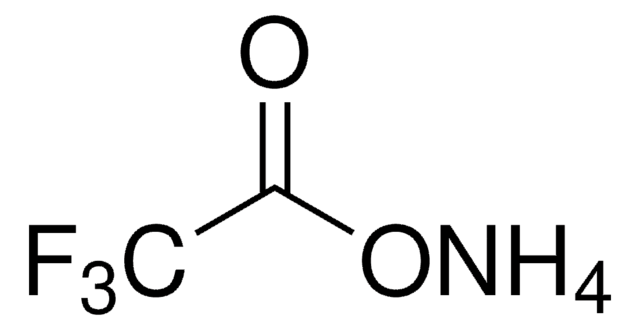91707
Trifluoroacetic acid
puriss. p.a., suitable for HPLC, ≥99.0% (GC)
Synonym(s):
TFA
About This Item
Recommended Products
vapor density
3.9 (vs air)
Quality Level
vapor pressure
97.5 mmHg ( 20 °C)
grade
puriss. p.a.
Assay
≥99.0% (GC)
form
liquid
technique(s)
HPLC: suitable
LC/MS: suitable
impurities
≤0.05% water
refractive index
n20/D 1.3 (lit.)
pH
1 (20 °C, 1 g/L)
bp
72.4 °C (lit.)
mp
−15.4 °C (lit.)
solubility
water: soluble
density
1.489 g/mL at 20 °C (lit.)
λ
1 cm path, H2O reference
UV absorption
λ: 260 nm Amax: 0.9
λ: 270 nm Amax: 0.1
λ: 280 nm Amax: 0.08
λ: 290 nm Amax: 0.07
λ: 300 nm Amax: 0.06
λ: 320 nm Amax: 0.05
suitability
corresponds to standard for RP gradient test
SMILES string
OC(C(F)(F)F)=O
InChI
1S/C2HF3O2/c3-2(4,5)1(6)7/h(H,6,7)
InChI key
DTQVDTLACAAQTR-UHFFFAOYSA-N
Looking for similar products? Visit Product Comparison Guide
Related Categories
General description
Application
- Preparation of TFA reagent for the estimation of serum vitamin A.
- To compose the binary solvent system for the isolation of large denatured peptides by reverse phase high performance liquid chromatography.
- A mobile-phase additive for liquid chromatography-mass spectrometry (LC-MS) analysis.
- Preparation of artemisinin under optimized reaction conditions.
Packaging
Signal Word
Danger
Hazard Statements
Precautionary Statements
Hazard Classifications
Acute Tox. 4 Inhalation - Aquatic Chronic 3 - Eye Dam. 1 - Skin Corr. 1A
Storage Class Code
8A - Combustible corrosive hazardous materials
WGK
WGK 2
Flash Point(F)
>212.0 °F - Pensky-Martens closed cup
Flash Point(C)
> 100 °C - Pensky-Martens closed cup
Certificates of Analysis (COA)
Search for Certificates of Analysis (COA) by entering the products Lot/Batch Number. Lot and Batch Numbers can be found on a product’s label following the words ‘Lot’ or ‘Batch’.
Already Own This Product?
Find documentation for the products that you have recently purchased in the Document Library.
Customers Also Viewed
Protocols
Overcome challenges in synthesis and disulfide bond formation with protocols for Fmoc solid-phase peptide synthesis of peptides with cysteine and methionine.
Our team of scientists has experience in all areas of research including Life Science, Material Science, Chemical Synthesis, Chromatography, Analytical and many others.
Contact Technical Service



